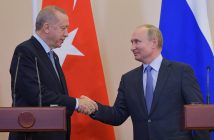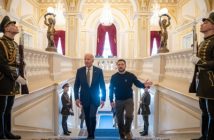Warsaw, Jan 28 (IANS) For the first time, Russia was not invited to an annual ceremony marking the liberation of the former Auschwitz-Birkenau Nazi death camp in Poland.
Friday’s event marked the 78th anniversary of the Soviet army liberating the concentration and extermination camp in German-occupied Poland, where more than one million people were murdered by the Nazis.
Auschwitz-Birkenau was created as a part of the Holocaust, a process that started with discrimination against Jewish people, and ended with six million Jews being killed because of who they were.
In total, 1.1 million people died in the camp, around one million Jews from across Europe as well as Poles, Soviet POWs, Roma and Sinti.
The event was attended by a group of 18 Auschwitz and Holocaust survivors, as well as Polish President Andrzej Duda and Second Gentleman of the US, Doug Emhoff.
Russia is usually represented at the ceremony, as the camp in occupied Poland was liberated by the Soviet Army.
But this time in the wake of Russia’s ongoing war against Ukraine, the Auschwitz-Birkenau museum declined to invite Russian officials and its director, Piotr M. A. Cywinski, likened Moscow’s invasion to the horrors of the Holocaust.
In his address at the event, Cywinski said: “It is difficult for us to stand here. More difficult than before. First, war violates treaties, then borders, finally people. Civilian victims, dehumanised, terrorised, humiliated, they do not die by chance. They are taken hostage by wartime megalomania.
“The Warsaw district of Wola, Zamojszczyzna, Oradour and Lidice, now bear different names: Bucha, Irpin, Hostomel, Mariupol and Donetsk (all war-affected regions in Ukraine). Similar sick megalomania, similar lust for power. And almost same-sounding myths of exceptionalism, of greatness, of primacy, but written in Russian.
“Being silent means giving voice to the perpetrators, staying neutral means reaching out to the rapist, remaining indifferent is tantamount to condoning murder. And today, before our very eyes, our memory is putting us to the test…”
At the event, Auschwitz survivors also expressed their fears over the fallout of the war in Ukraine.
Polish survivor Zdzislawa Wlodarczyk said she was “scared to hear what is happening in the East”.
She told the audience that she had arrived in Auschwitz as an 11-year-old following the Warsaw Uprising, a failed attempt by the Polish resistance in 1944 to liberate the city from the German occupiers.
She and her seven-year-old brother remained in the camp until the Soviet army liberated it on January 27, 1945.
“Today, when I stand in the Auschwitz-Birkenau Memorial, I am frightened when I follow the news coming from the East about the war. The Russian army, that liberated us here, now wages war in Ukraine. Why? Why?” she said.
In response to not being invited to the event, Russia accused the museum of attempting to “rewrite history”, reports the BBC.
“No matter how our European ‘non-partners’ contrived in their attempts to rewrite history in a new way, the memory of the Soviet heroes-liberators and horrors of Nazism cannot be erased,” Russian Foreign Ministry spokeswoman Maria Zakharova wrote in a social media post.
Russia’s Chief Rabbi Berel Lazar also spoke about his regret that Moscow had been excluded from the commemoration, warning that “these political games have no place on Holocaust day”.
–IANS
ksk/





